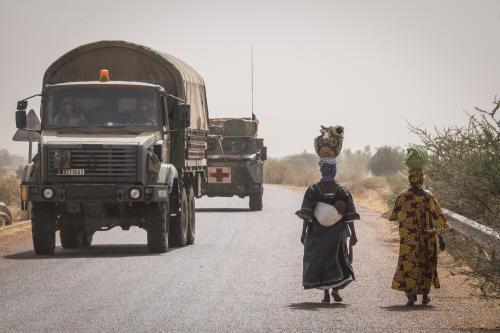Recent Violence Threatens the Lamu Port Project
As reported this week by The Wall Street Journal, violent land disputes have threatened to derail the Lamu Port-South Sudan-Ethiopia corridor project (LAPSSET). For example, an attack in June in the Kenyan town of Mpeketoni, near Lamu, that killed 65 people was speculated to have been conducted by either local political groups over land rights or al-Shabab. Either way, the violence has contributed to investor wariness. The project also is expected to displace 146 families, but the government announced this week that displaced persons will be compensated before ground is broken , which is scheduled for September.
Earlier this month, Kenyan President Uhuru Kenyatta announced approval of a nearly $480 million dollar loan to initiate LAPSSET. The loan was provided by the China Communication Construction Company and is expected to fund construction of the first three berths out of 32 berths planned for the port. The other major investor is the African Development Bank. Eventually, the LAPSSET project hopes to include pipelines to oil fields in Uganda and South Sudan.
Chadian Forces Rescue a Boko Haram-Abducted Village
A string of Boko Haram attacks occurred over the past week. Eighty-five abducted villagers from the Nigerian village of Doron Bag by Lake Chad were reportedly rescued by Chadian military forces when the militants’ convoy was stopped at the Chadian border. However, neither government has confirmed reports. Typically, the borders in the Lake Chad region are weakly enforced, which allows Boko Haram militants to move easily between Cameroon, Chad, Niger and Nigeria. In fact, last month, these countries pledged to form a regional anti-Boko Haram task force.
Witnesses have also reported that Liman Kara, a Nigerian police training academy, has been overrun by Boko Haram militants. The training center is located near Gwoza, a town that has been completely seized by the militant group.
Borders Close around Africa Due to Ebola While Investors Discuss Economic Impacts of the Virus
South Africa joined a growing list of African countries that are closing or tightening their borders to persons from countries with a “high risk” of spreading Ebola. Cameroon, Gambia, Côte d’Ivoire, Kenya, Nigeria and Senegal are among the countries that have announced travel restrictions. Korean Airlines has halted flights from Kenya (its only African destination), despite no reported cases of the virus in Kenya. Some Air France crews have refused to fly their routes to Ebola-afflicted countries. The World Health Organization has warned that travel restrictions will not stop the virus, and, in some cases, these restrictions may increase fears of supply shortages and decrease the capacity to respond to the disease. The WHO recommends border screenings, rather than outright bans.
Moody’s investor service has estimated that critical commercial and transport disruptions due to the outbreak will last at least one month. Increased health expenditures are expected to drain the budgets of Liberia, Guinea and Sierra Leone. In addition, both the World Bank and the IMF have decreased their estimated growth forecasts for Guinea. Emergency aid is being prepared by the World Bank as well as the African Development Bank to reduce the economic implications of the virus.
In the slum neighborhood of West Point in Monrovia, Liberia, an attack on an Ebola clinic left approximately 17 Ebola patients missing for nearly a week. There are speculations that the attacking mob was angry about the placement of the facility in the slum or that the mob was protesting the clinic, claiming the Ebola outbreak is a hoax. The Liberian government has now barricaded West Point in order to further quarantine the neighborhood, a move that has led to clashes with police and soldiers. President Ellen Sirleaf-Johnson has also instituted a curfew and the closing of “entertainment centers.”
The Brookings Institution is committed to quality, independence, and impact.
We are supported by a diverse array of funders. In line with our values and policies, each Brookings publication represents the sole views of its author(s).




Commentary
Africa in the News: Lamu Port Project Updates, More Boko Haram Attacks, and Ebola Forces Border Closures
August 22, 2014